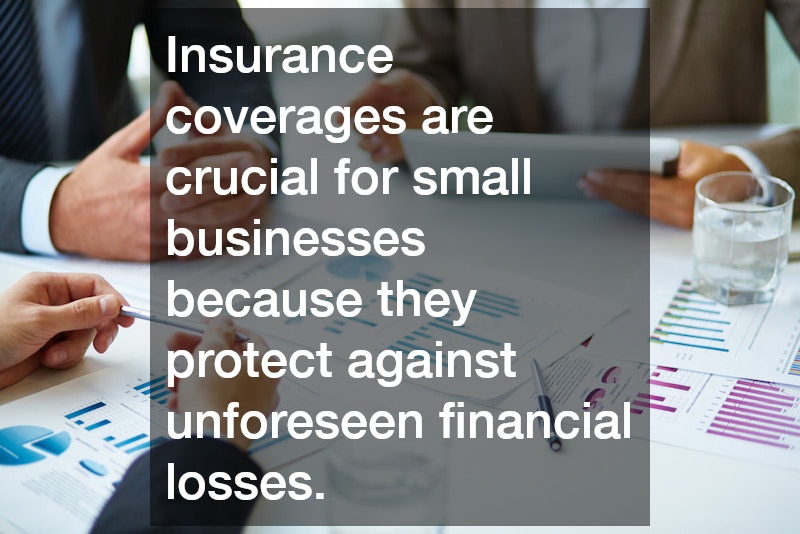Key Insurance Coverages Every Small Business Should Have
Insurance coverages are crucial for small businesses because they protect against unforeseen financial losses that can otherwise cripple operations. Understanding the types of insurance available is the first step in safeguarding your business’s future.
For small businesses, insurance can mean the difference between recovery and closure after unexpected events. It provides a safety net that ensures continuity and business resilience.
This article aims to highlight the essential business insurance policies that every small business should consider to safeguard against a variety of financial risks. Knowing which policies are indispensable allows business owners to invest wisely in their protection strategies.
What Types of Insurance Does My Small Business Need?
General Liability Insurance
General liability insurance is fundamental for all businesses as it provides protection against claims of bodily injury or property damage. This type of coverage is essential to shield businesses from the high costs associated with legal claims and lawsuits.
Without general liability insurance, small businesses might face significant financial burdens that could hinder their operations. Protecting against such claims fosters public trust and demonstrates a commitment to responsible business practices.
This insurance is particularly valuable given the litigious nature of today’s business environment, where even minor incidents can lead to costly legal proceedings. It offers peace of mind, allowing business owners to focus on growth instead of potential liabilities.
Property Insurance
Property insurance is vital in covering damages to business assets due to unforeseen events like fires, theft, or natural disasters. This type of insurance ensures that businesses can quickly recover and rebuild in the aftermath of such incidents.
By securing property insurance, small businesses protect their physical assets, which are often significant investments. This coverage minimizes downtime and financial loss following an unexpected event.
Given the unpredictability of environmental and human factors, property insurance acts as a protective shield for business premises and contents. This insurance ensures continuity by covering repair or replacement costs, thus stabilizing finances post-crisis.
How Much Does Insurance for Small Businesses Typically Cost?
Factors Influencing Insurance Costs
The cost of insurance for small businesses varies based on several factors, including business size, location, industry-specific risks, and desired coverage limits. Larger businesses or those in high-risk industries may face higher premiums due to increased exposure to potential claims.
Location can also impact insurance costs, with businesses in areas prone to natural disasters or crime seeing increased rates. Additionally, the specific insurance needs related to a business’s operational scope can influence premium calculations.
Understanding these factors helps business owners anticipate potential costs and plan their insurance budgets effectively. By evaluating these elements, businesses can select policies that provide adequate coverage without overextending financially.
Cost Management Tips
Small businesses can manage insurance expenses by bundling policies, thereby reducing premiums through multi-policy discounts. Bundling multiple types of insurance with the same provider can streamline management and result in savings.
Another cost-effective strategy is to raise deductible amounts, which can significantly lower premium costs. Businesses should weigh the risks and benefits of higher deductibles to ensure financial ability to cover out-of-pocket expenses when necessary.
Regularly reviewing coverage needs in relation to business changes and market conditions ensures that insurance remains both economically viable and adequately protective. Proactively adapting insurance strategies can lead to optimized cost management.
Are There Insurance Coverages Specific to My Industry?
Industry-Specific Insurance Needs
Different industries may require specialized insurance policies, like professional liability for consultants or cyber liability for tech companies. These specialized coverages address unique risks associated with particular business sectors to ensure comprehensive protection.
Understanding industry-specific risks enables businesses to tailor their insurance packages effectively. It’s crucial to have policies that align with the specific operational vulnerabilities of your industry.
For instance, healthcare providers might require malpractice insurance, while food service operators may need product liability and contamination coverages. Identifying and securing industry-specific coverages helps mitigate risks inherent to each business type.
Customized Insurance Solutions
Customized insurance solutions offer tailored packages that address the specific risks and needs of different industries. These solutions ensure businesses receive adequate protection without unnecessary coverage.
Working with an experienced insurance provider can help businesses design policies that cater to their unique requirements. Providers offer advice on industry-standard protections and suggest enhancements to coverage when needed.
Tailored insurance packages can help businesses achieve comprehensive coverage, accounting for every potential risk associated with their sector. This approach not only provides peace of mind but also ensures efficient use of insurance budgets.
Conclusion
In conclusion, having the right insurance coverages is crucial for small businesses to protect against financial risks and ensure operational continuity. By understanding the necessary policies and industry-specific needs, businesses can build a robust insurance strategy.
Investing in essential coverages like general liability and property insurance, and considering industry-specific options, fortifies a business against potential threats. Insurance remains a key element in safeguarding a business’s future and financial stability.
Ultimately, the right insurance solutions enable small businesses to navigate uncertainties confidently, focusing on growth and development while being protected against unforeseen events. Strategic insurance planning is an invaluable tool for long-term success.

